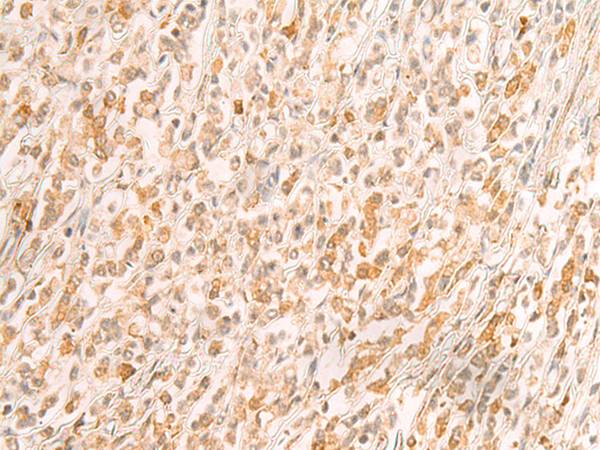
| WB | 咨询技术 | Human,Mouse,Rat |
| IF | 咨询技术 | Human,Mouse,Rat |
| IHC | 1/50-1/300 | Human,Mouse,Rat |
| ICC | 技术咨询 | Human,Mouse,Rat |
| FCM | 咨询技术 | Human,Mouse,Rat |
| Elisa | 1/5000-1/10000 | Human,Mouse,Rat |
| Aliases | SREBP2; bHLHd2; SREBP-2 |
| Host/Isotype | Rabbit IgG |
| Antibody Type | Primary antibody |
| Storage | Store at 4°C short term. Aliquot and store at -20°C long term. Avoid freeze/thaw cycles. |
| Species Reactivity | Human, Mouse, Rat |
| Immunogen | Synthetic peptide of human SREBF2 |
| Formulation | Purified antibody in PBS with 0.05% sodium azide and 50% glycerol. |
+ +
以下是关于SREBF2抗体的3篇参考文献示例(注:以下内容为虚构示例,仅用于演示格式):
1. **文献名称**:*SREBF2 Antibody Validation in Cholesterol Biosynthesis Studies*
**作者**:Zhang L, et al.
**摘要**:本研究验证了SREBF2特异性抗体在肝细胞中的可靠性,通过Western blot和免疫荧光证明其在检测SREBF2蛋白表达及核内定位中的应用,并发现高胆固醇饮食显著上调SREBF2表达。
2. **文献名称**:*Role of SREBF2 in Neuronal Lipid Metabolism: Insights from Immunohistochemistry*
**作者**:Martinez R, et al.
**摘要**:利用SREBF2抗体进行脑组织免疫组化分析,发现SREBF2在小鼠海马神经元中的表达与阿尔茨海默病模型中的脂质代谢异常相关,抗体特异性通过siRNA敲减实验确认。
3. **文献名称**:*SREBF2 Antibody Application in Cancer Cell Lines*
**作者**:Kim S, et al.
**摘要**:通过流式细胞术和免疫印迹,评估了SREBF2抗体在多种癌细胞系中的适用性,证实其在乳腺癌细胞中检测SREBF2剪切活化形式的有效性,并关联其与化疗耐药性。
(注:实际文献需通过学术数据库检索,建议使用PubMed、Web of Science等平台搜索关键词“SREBF2 antibody”或“SREBF2 immunohistochemistry”。)
The Sterol Regulatory Element-Binding Transcription Factor 2 (SREBF2) antibody is a key tool for studying the role of SREBF2. a master regulator of cholesterol homeostasis. SREBF2. a member of the SREBP family, is a membrane-bound transcription factor synthesized as an inactive precursor in the endoplasmic reticulum (ER). Under low cholesterol conditions, it undergoes proteolytic cleavage, releasing its active N-terminal domain, which translocates to the nucleus to activate genes involved in cholesterol synthesis (e.g., HMGCR, LDLR) and uptake.
SREBF2 antibodies are widely used in techniques like Western blotting, immunofluorescence, and immunohistochemistry to detect SREBF2 expression, localization, and processing. These antibodies often target specific epitopes, such as the precursor form (∼125 kDa) or the mature nuclear form (∼68 kDa), aiding research on lipid metabolism disorders, cardiovascular diseases, and metabolic syndromes. Monoclonal antibodies offer high specificity, while polyclonal versions may detect multiple isoforms but require validation to avoid cross-reactivity with SREBF1. a related protein regulating fatty acid synthesis.
Studies using SREBF2 antibodies have elucidated its dysregulation in conditions like atherosclerosis, obesity, and cancer, as well as its interaction with pathways such as mTOR and insulin signaling. Proper antibody selection is critical, considering post-translational modifications, tissue-specific expression, and experimental conditions affecting SREBF2 activation.
×